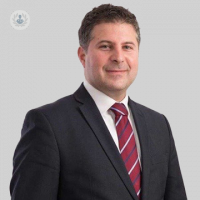An expert insight into targeted therapies for lung cancer
Escrito por:Targeted therapies, which are drugs designed to find and attack certain cancer cells, may be recommended instead or in combination with other cancer treatments for some types of lung cancer.
Here, renowned consultant medical oncologist Dr Dionysis Papadatos-Pastos, provides an expert insight into how targeted therapies are used for lung cancer and what are the most common therapies.

What are the most effective targeted therapies for lung cancer?
Targeted therapies for lung cancer aren't new – in fact, they have been used for more than 10 years. What is new is that now there are much more targeted therapy drugs available.
How do targeted therapies work? Targeted therapies work by effectively exploiting a specific weakness (for example, mutations) in the cancer cells that has previously been identified via a specialised test performed in the DNA of the cancer cells. After the weakness has been recognised, the correct targeted therapy is then selected to inhibit (switch off) that weakness. This stops the cancer from growing.
What are the most common and popular ones?
One of the very first recognised weaknesses are mutations in the EGFR gene. These are mutations that help the cancer cells to grow and survive without any influences from external tissues or metastasis, and are most commonly found in patients who have never smoked and patients who smoked in the past.
Mutations in the EGFR gene can now be treated with third generation EGFR targeted therapies, especially a drug called Osimertinib which is used to help cure patients who have early stage lung disease. These targeted therapies are not only very effective in stopping the cancer from growing, but they also have a very good side effect profile, meaning that the expected toxicity is well manageable without hindering quality of life.
With effective therapy, what is the expected prognosis of the lung cancer patient?
It’s important to provide some examples.
Patients who had activating EGFR mutations when EGFR targeted therapies weren’t available had a life expectancy that was probably closer to a year. That was the median overall survival rate. Now, with the availability of targeted therapies and new developments in the field, we are talking about years.
Similarly, targeted therapies against anaplastic lymphoma kinase (ALK) have shown that they can increase patients’ survival rate by five years. This is from 10 per cent before targeted therapies to more than 60 per cent now, which are figures that hopefully will improve even more. There is very active research in the background with more effective and less toxic targeted therapies in the pipeline, and hopefully these will be available at clinics soon.
Is targeted therapy the first treatment option recommended to lung cancer patients?
In most cases, the answer is yes. When there is a change in the DNA where we can identify a weakness, then the relevant targeted therapy is the best way forward. However, this isn’t a one-size-fits-all approach, because there are other targeted therapies available which are instead used after immunotherapy or chemotherapy. This is where the expertise of the lung cancer oncologist will come into place, helping to determine which treatment option to use.
I’ll give an example. For many years, the Kirsten rat sarcoma viral oncogene homologue (KRAS) mutation was deemed “undruggable” by oncologists, because a drug couldn’t be developed to treat this mutation. Now, there are drugs available for this mutation, but these are licensed to be used as second line treatments after immunotherapy or chemotherapy to help patients live longer. In the near future, hopefully these targeted therapies or perhaps a combination of these targeted therapies with other treatments will evolve to become first line treatments that prolong life and also offer a better quality of life.
Dr Dionysis Papadatos-Pastos is a leading consultant medical oncologist with over 15 years of experience.
If you are considering targeted therapy and you would like to consult your options, don’t hesitate to book an appointment with Dr Papadatos-Pastos via his Top Doctors profile today.


